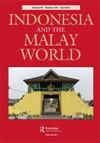A nativist defence of Javanism in late 19th-century Java
IF 0.9
3区 社会学
0 ASIAN STUDIES
引用次数: 3
Abstract
ABSTRACT The Suluk Gaṭoloco is a notoriously anti-Islamic satirical narrative poem, composed anonymously sometime in 19th-century Java. This article challenges Pigeaud’s hypothesis that it once belonged to the curriculum of Islamic religious schools in Panaraga. The contents of the so-called Sĕrat Suluk Panaraga, i.e. a two-volume compilation of texts on Islamic mysticism and theology, kept in the Berlin State Library (Ms. or. oct. 3999 and 4000), is discussed in some detail, showing that it contains variegated teachings. The version of the Suluk Gaṭoloco in the Berlin manuscript is close to Philippus van Akkeren’s 1951 edition, but exclusively concentrates on the theological disputes of Gaṭoloco with his scripturalist Islamic adversaries. The argument in Gaṭoloco’s narrative is built upon a discourse of ‘turning to the origins’. At a time when the traditional Javanese way of life was threatened by Dutch colonialism and ‘Arabised’ Islam, the Suluk Gaṭoloco constituted a nativist defence of indigenous customs which must have struck a chord among educated Javanese readers, but it is hardly conceivable that students of Islamic boarding schools were its primary readers. The Sĕrat Suluk Panaraga was originally compiled in 1894 and it was copied in 1901 in Blora on behalf of a Dutch colonial administrator called Paardekooper (1857–1905). This compilation is one among many more Javanese texts in Paardekooper’s overall copying programme which focused on the reading material of the Javanese bureaucratic elite.19世纪晚期爪哇本土主义者对爪哇主义的辩护
摘要苏鲁克Gaṭ《oloco》是一首臭名昭著的反伊斯兰讽刺叙事诗,创作于19世纪的爪哇岛。这篇文章挑战了皮格的假设,即它曾经属于帕纳拉加伊斯兰宗教学校的课程。对柏林国家图书馆保存的所谓《Sĕrat Suluk Panaraga》的内容进行了详细讨论,该书是一本关于伊斯兰神秘主义和神学的两卷本汇编(Ms.or.oct.3999和4000),表明它包含了丰富多彩的教义。苏鲁克Ga的版本ṭ柏林手稿中的oloco与Philippus van Akkeren 1951年的版本接近,但完全集中在Ga的神学争议上ṭ奥洛科与他的圣经主义伊斯兰对手。Ga中的论点ṭ奥洛科的叙述建立在“转向起源”的话语之上。当传统的爪哇人生活方式受到荷兰殖民主义和“阿拉伯化”伊斯兰教的威胁时ṭ《oloco》构成了对土著习俗的本土主义辩护,这一定引起了受过教育的爪哇读者的共鸣,但很难想象伊斯兰寄宿学校的学生是它的主要读者。Sĕrat Suluk Panaraga最初编纂于1894年,1901年代表一位名叫Paardekooper(1857-1905)的荷兰殖民管理者在布洛拉复制。该汇编是Paardekooper的整体复制计划中众多爪哇文本之一,该计划侧重于爪哇官僚精英的阅读材料。
本文章由计算机程序翻译,如有差异,请以英文原文为准。
求助全文
约1分钟内获得全文
求助全文
来源期刊

Indonesia and the Malay World
ASIAN STUDIES-
CiteScore
2.00
自引率
0.00%
发文量
17
期刊介绍:
Indonesia and the Malay World is a peer-reviewed journal that is committed to the publication of scholarship in the arts and humanities on maritime Southeast Asia. It particularly focuses on the study of the languages, literatures, art, archaeology, history, religion, anthropology, performing arts, cinema and tourism of the region. In addition to welcoming individual articles, it also publishes special issues focusing on a particular theme or region. The journal is published three times a year, in March, July, and November.
 求助内容:
求助内容: 应助结果提醒方式:
应助结果提醒方式:


